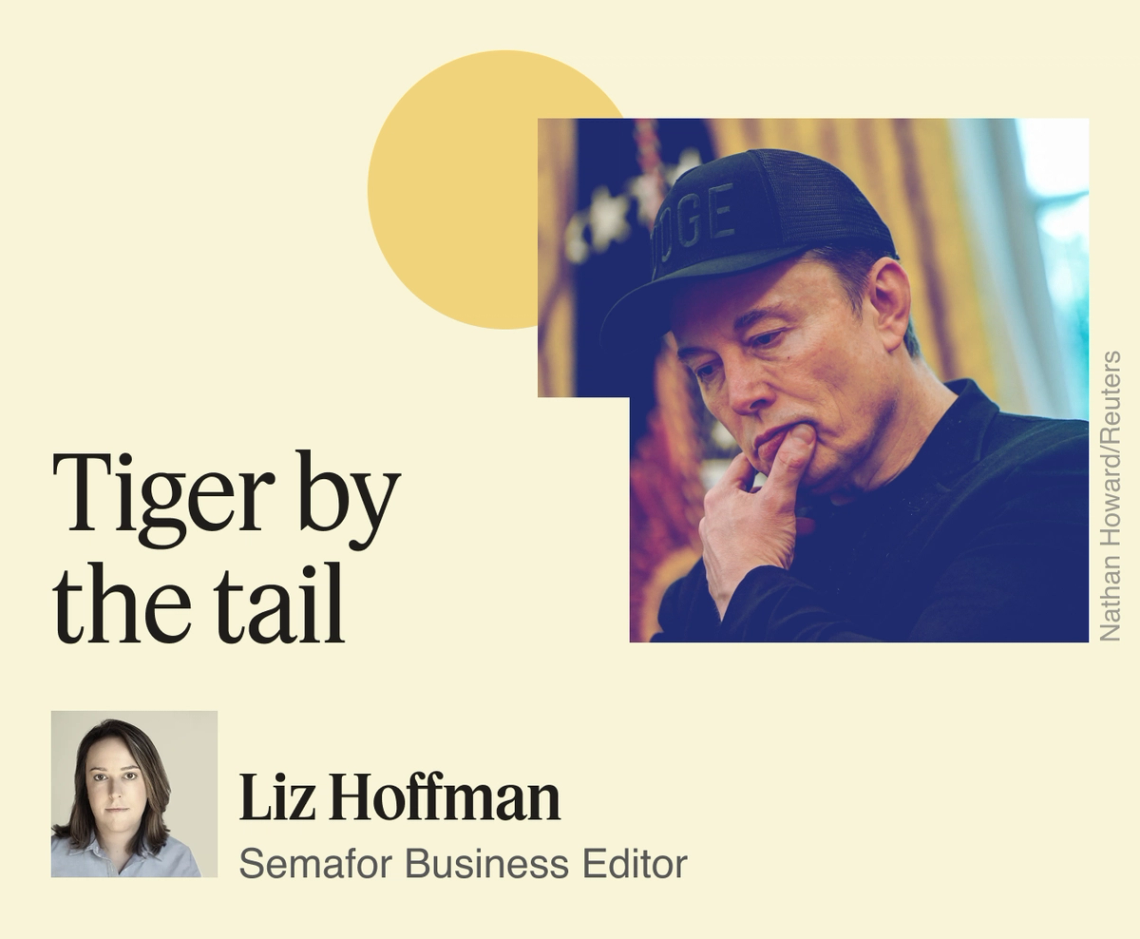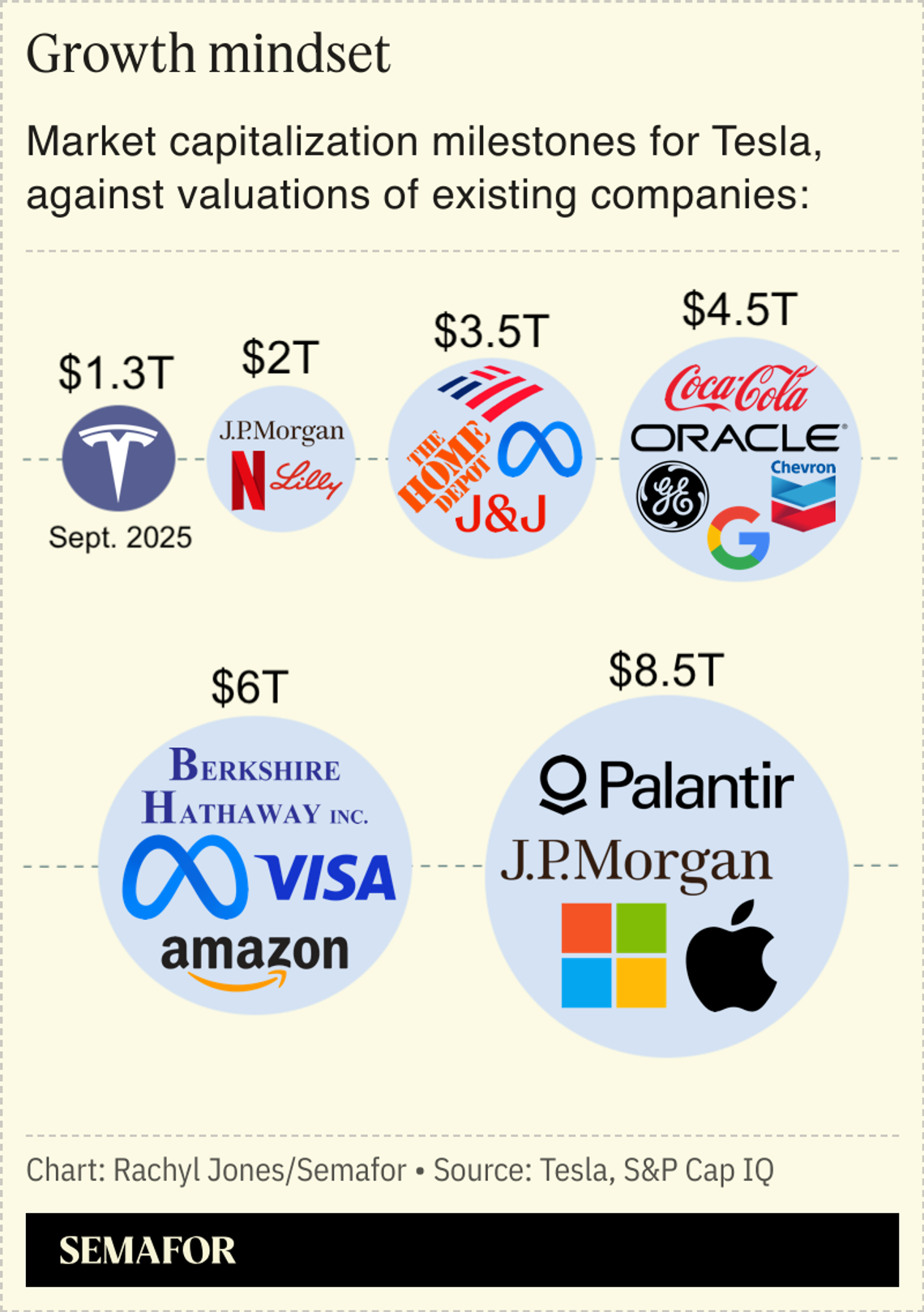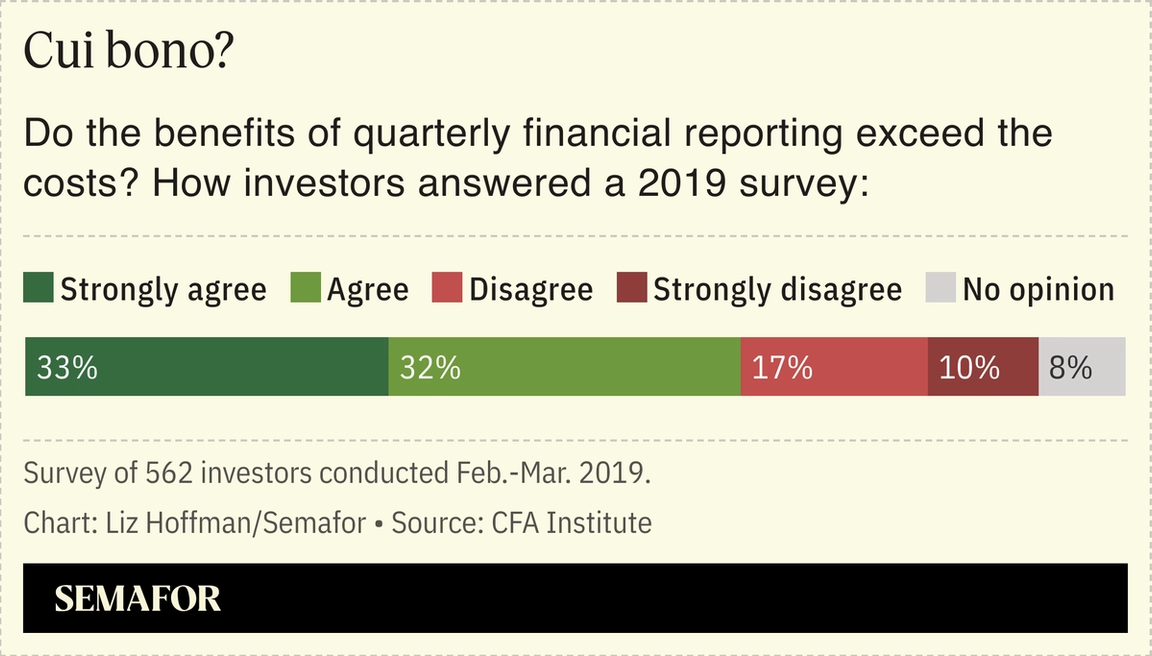| | In this edition, Tesla’s board chair defends Musk’s $1 trillion pay package, and big banks are losin͏ ͏ ͏ ͏ ͏ ͏ |
| |  | Business |  |
| |
|
 - Tesla board chair on Musk
- Banks vs. crypto
- ‘Great half, guys’
- A TikTok deal, finally
- Exxon’s mom-and-pop army
 The Swiss watch industry is trolling Trump over tariffs |
|
 How do you solve a problem like Elon Musk? Musk possesses an almost supernatural ability to conjure investor zeal and create products that redefine entire industries. But his polarizing persona overshadows the genius and genuine appeal of those products. He is both an irreplaceable asset and a clear liability, and the challenge for Tesla’s board is balancing that ledger. Its once press-shy board chair, Robyn Denholm, has been making the rounds over the past week, defending the up-to-$1 trillion pay package awarded to the billionaire CEO. Governance scolds are appalled by the number, as is the pope. The package actually does a good job aligning incentives. Musk gets rich, but only if his shareholders get far richer. The package’s operational milestones over the next decade — delivering 20 million cars, achieving true self-driving capability for 10 million users, and deploying 1 million robotaxis — create guardrails against quick-fix theatrics. By the conventions of the corporate-governance world, it gets a lot of things right.  Yet Musk represents something larger than a governance puzzle for Tesla. He embodies a seismic shift where power once safely housed in institutions — boards, brands, universities, regulators — now flows toward magnetic individuals who can either outshine or undermine the establishment. Musk is constantly doing both, leaving Tesla’s directors holding a tiger by the tail. (Tesla’s stock would almost certainly tank if Musk left.) It’s an expensive leash he’s on, but better than letting go. Read more from our interview with Denholm below, including some surprising skepticism about the merits of entwining Tesla with xAI. One more thing — tomorrow I’ll be moderating The Business of Luxury, sitting down with executives from Veronica Beard, Art Basel, Sotheby’s, FlyHouse, Genesis, and more. You can request an invitation here, and please send questions! (Just reply to this email.) |
|
Tesla-xAI deal has a surprise skeptic |
 Christine Chen/Reuters Christine Chen/ReutersTesla’s board chair said she isn’t convinced that Elon Musk’s conservative political turn has hurt the company’s car sales. Tesla’s board members “have access to a lot of information, and it’s not conclusive one way or another,” Robyn Denholm said in an interview Monday. “There could be [some impact], but there were other factors as well,” she said, including Tesla’s decision to shut down and retool its main factory this summer. Musk’s stint in the White House and continued embrace of right-wing causes have alienated consumers, polls repeatedly found, and coincided with plummeting sales of Teslas, particularly in progressive Europe. Denholm also said she isn’t entirely sold on the idea of Tesla investing in Musk’s xAI, a hypothetical that shareholders will vote on in November. “It’s quite distinct, what the two companies are doing,” she said. “There is always some overlap, but not as much as people think.” Denholm also defended the eye-watering pay package Tesla awarded Musk earlier this month. |
|
Wall Street senses weakness — its own |
 Evelyn Hockstein/Reuters Evelyn Hockstein/ReutersBig banks are losing the Washington lobbying battle — and they know it. Concerns that the once-powerhouse industry is being eclipsed in the influence war by crypto spurred Citi CEO Jane Fraser to replace the head of the Financial Services Forum, which represents the eight largest US banks, last month, Semafor scooped Monday. Taking his place is a veteran of the US Chamber of Commerce and the oil lobby, in a move that industry executives hope will bring a more aggressive stance. That one of the country’s biggest and most economically central industries got outmaneuvered by a fringe sector speaks to the new pecking order in Trump’s second term. Crypto has enriched the president’s family, donated millions to his political apparatus, and has its own White House czar in the surprisingly effective David Sacks. Banks are still waiting for more rollbacks of 2008 regulations they feel they were promised — and which are still likely coming, though more slowly than Wall Street would like. — Rachel Witkowski, Liz Hoffman, and Eleanor Mueller |
|
Consensus on corporate earnings |
Donald Trump, Hillary Clinton, and Warren Buffett don’t agree on many things, but doing away with quarterly earnings reports for public companies is one of them. The president’s support for allowing corporate executives to report earnings every six months, instead of every three, could push an idea long floated as a fix for short-term market pressures. The idea has even gotten support from corporate lawyers for whom proofing quarterly earnings reports is, if not a source of big fees, at least a way to keep clients close. Easing public-company burdens could make IPOs more appealing at a time when more companies are staying private for longer. The 2012 JOBS Act, which loosened reporting requirements for smaller companies, did coax some startups — one academic study found a 25% increase in listings, controlling for other factors — though nobody will confuse the 2010s as a banner decade for public markets.  It’s unclear whether investors will go along: BlackRock CEO Larry Fink has complained about “the culture of quarterly earnings hysteria” but warned that “long-termism should not be a substitute for transparency.” When the CFA Institute surveyed investors in 2019 on the topic, 65% said the benefits outweighed the costs (which are, of course, ultimately borne by investors). “The SEC is trying to solve a problem that does not exist,” went one typical comment. When asked about any downsides, one S&P 500 CFO on Monday told Semafor that he’d get a less-frequent window into what his competitors are up to. |
|
 Dado Ruvic/Illustration/File Photo/Reuters Dado Ruvic/Illustration/File Photo/ReutersUS and Chinese officials reached the outlines of a TikTok deal that would bring in new American money while keeping control of the company’s algorithm in Beijing. After two days of trade talks, Wang Jingtao, deputy head of China’s cybersecurity regulator, told reporters Monday night that a licensing deal had been struck, without providing details. It’s likely to hew closely to the deal arranged by the White House earlier this year, in which Oracle would continue to store the information of TikTok’s US users while existing ByteDance shareholders, including KKR and General Atlantic, would invest. Xi Jinping and Trump are set to talk Friday. |
|
Exxon’s new boardroom weapon |
 Raphael Satter/Reuters Raphael Satter/ReutersExxonMobil has faced down environmental and shareholder activists for decades — and is now drafting its mom-and-pop investors into the fight. Federal regulators on Monday blessed the oil giant’s plans to roll out a program that lets its retail shareholders automatically vote their shares in favor of management’s recommendations, Semafor’s Rohan Goswami reported. The company cited a desire to “level the playing field” between individual investors, who often find it’s not worth the hassle to vote in corporate elections, and investment firms with large megaphones. It’s the first program of its kind at a large company. Shareholder advocates quickly pushed back. Once investors are enrolled, “the annual boilerplate opt-out notices become part of the noise of materials and statements they don’t respond to,” Alex Thaler, CEO of Iconik, which makes software to enable retail voting, told Semafor. |
|
Coachella tickets go on sale Friday, two months earlier than last year, in what looks to us like a niche recession indicator. It gives the festival extra time to sell concert-goers on buy-now-pay-later plans that more than half of attendees opted for last year, when a $41 upfront fee to reserve the $599 ticket worked out to an annualized interest rate of around 20%. |
|
➚ BUY: Equities. The S&P 500 has touched fresh highs ahead of an expected cut in interest rates by the Federal Reserve this week. Lower borrowing costs tend to push investors toward riskier bets like stocks. ➘ SELL: Inequities. The richest 10% of Americans account for nearly half of all consumer spending, the highest since at least 1989, Moody’s finds. |
|
 Companies & Deals- Harder than it looks: Just 5% of Salesforce’s 150,000+ customers are paying for the company’s AI automation service, Agentforce, which isn’t quite as plug-and-play as CEO Marc Benioff thought, according to The Information.
- A lone voice: Anthropic execs are in DC this week to press lawmakers for a federal policy around job automation, engaging a looming threat from AI that few of its competitors want to touch, Semafor’s Morgan Chalfant reports.
- Direct to consumer: The US is in talks to create a $5 billion fund to invest in critical minerals, Bloomberg reported, providing Trump another dealmaking vehicle and potentially securing a pipeline of components critical to key industries.
Watchdogs- Wish list: The group of contenders to be the next Fed chair keeps growing, with former Fed official James Bullard and BlackRock markets guru Rick Rieder both said to be interviewing.
- Gate crashers: The FTC is reportedly probing Ticketmaster over whether it followed a law to prevent bots from illegally reselling tickets.
- Rank and fire: The fight over free speech is about to hit employers, as Vice President JD Vance said of individuals expressing support for Charlie Kirk’s killer: “Call them out, and hell, call their employer.”
|
|
|